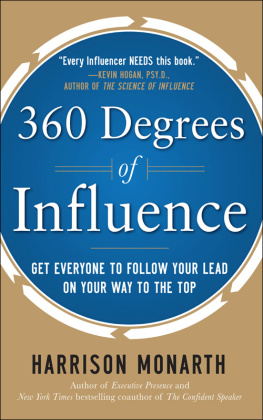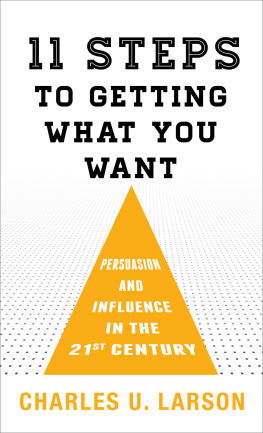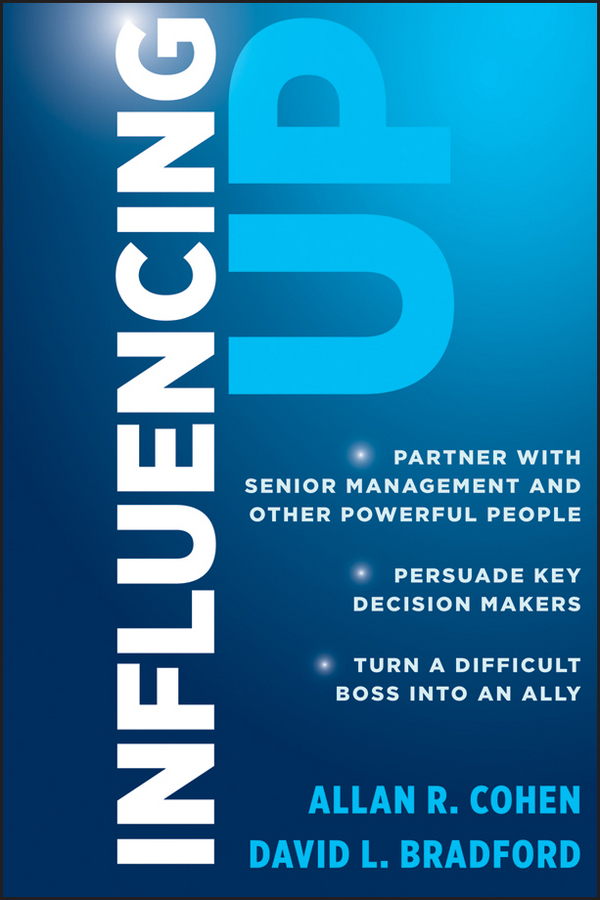Contents

Copyright 2012 by Allan Cohen and David Bradford. All rights reserved.
Published by John Wiley & Sons, Inc., Hoboken, New Jersey.
Published simultaneously in Canada.
No part of this publication may be reproduced, stored in a retrieval system, or transmitted in any form or by any means, electronic, mechanical, photocopying, recording, scanning, or otherwise, except as permitted under Section 107 or 108 of the 1976 United States Copyright Act, without either the prior written permission of the Publisher, or authorization through payment of the appropriate per-copy fee to the Copyright Clearance Center, Inc., 222 Rosewood Drive, Danvers, MA 01923, (978) 750-8400, fax (978) 646-8600, or on the web at www.copyright.com . Requests to the Publisher for permission should be addressed to the Permissions Department, John Wiley & Sons, Inc., 111 River Street, Hoboken, NJ 07030, (201) 748-6011, fax (201) 748-6008, or online at http://www.wiley.com/go/permissions .
Limit of Liability/Disclaimer of Warranty: While the publisher and author have used their best efforts in preparing this book, they make no representations or warranties with respect to the accuracy or completeness of the contents of this book and specifically disclaim any implied warranties of merchantability or fitness for a particular purpose. No warranty may be created or extended by sales representatives or written sales materials. The advice and strategies contained herein may not be suitable for your situation. You should consult with a professional where appropriate. Neither the publisher nor author shall be liable for any loss of profit or any other commercial damages, including but not limited to special, incidental, consequential, or other damages.
For general information on our other products and services or for technical support, please contact our Customer Care Department within the United States at (800) 762-2974, outside the United States at (317) 572-3993 or fax (317) 572-4002.
Wiley publishes in a variety of print and electronic formats and by print-on-demand. Some material included with standard print versions of this book may not be included in e-books or in print-on-demand. If this book refers to media such as a CD or DVD that is not included in the version you purchased, you may download this material at http://booksupport.wiley.com . For more information about Wiley products, visit www.wiley.com .
Library of Congress Cataloging-in-Publication Data:
Cohen, Allan R.
Influencing Up / Allan R Cohen, David L Bradford.
Includes index.
ISBN: 978-1-118-03845-1 (hardback)
ISBN: 978-1-118-22223-2 (ebk)
ISBN: 978-1-118-23609-3 (ebk)
ISBN: 978-1-118-26091-3 (ebk)
1. Influence (Psychology) 2. Persuasion (Psychology) 3. Interpersonal relations. 4. Business communication. I. Bradford, David L. II. Title.
BF774
658.409dc23
2012001520
Preface
This began as a book about managing your boss. Although we had addressed this topic in Influence without Authority, we discovered that more and more organizational members were struggling with this issue. Some still complained about overcontrolling, micromanaging bosses who gave them far too little latitude, yet many others were concerned about distant bossesoften located far awaywhose attention they could barely get and who seemed not to care about them. From dealing with toxic witches to elusive withholders, many asked our advice about what to do. The writing for this edition was under way when our editor at John Wiley & Sons, Inc., Richard Narramore, asked us to consider the possibility of widening the scope of the book to deal with influencing other powerful, senior people, whether at the top of ones own organization or in another organization as potential customer or client, business partner, or vital stakeholder.
We soon saw that even in situations where the powerful person or group to be influenced was less accessible, our core concepts of reciprocity/exchange and treating the powerful as potential partners could ameliorate the negative impacts of great power differentials between the powerful and less powerful. Partnership might be tougher to implement when the powerful dont know you existor care tobut it is still a useful mind-set for transforming relationships. Power differentials harm both the powerful and the less powerful, yet influence always involves exchanging what the powerful care about in return for what is desired.
Furthermore, broadening the scope let us utilize what we know about making change from below, another increasingly important topic. Organizations have discovered that in a complex, competitive and changing world, initiative has to come from all levels in order to develop new products, services, and processes that can increase the top line after years of focus on cutting costs. But how do people below take initiative effectively?
At the same time, there has been a leap of interest and research about the behavior of the powerful when there are power gaps. Probably stimulated by the misbehavior of so many corporate and financial leaders, with the attendant parade of corporate and financial executives through the headlines or into court, researchers in many fields designed experiments, surveys, and fieldwork to examine the phenomenon. This was intriguing but somewhat one-sided in focus: seeing the behavior of only those with high power arouses great indignance but omits the role of the less powerful in perpetuating their perceived disempowered state. Seeing the interrelationships between those with high differences in power is a necessary part of the story. It is somewhat less satisfying because it reduces the ability to portray the powerful in totally negative waysadmittedly, occasionally totally deserved, as the victims of Bernie Madoff would attestbut includes the systemic effects collaborated with by the less powerful.
Most important, we concluded that the less powerful didnt have to wait for the powerful to magically be transformed into receptive supporters. They can use our concepts to influence even when those above arent particularly welcoming or receptive.
The subject turned out to be incredibly intriguing. Although all influence is about exchange, it is extremely hard to make exchanges when the power gap is too large. This calls for reducing power gaps, not by reducing the power of those who have it, but by increasing the power of those who do not have enough. Making senior executives weak is not a very good strategy for growing healthy organizations. For powerful people to be really effective in the long run, they need to have powerful people below, even though many do not recognize this or even fight it. The blindness of the powerful that is a consequence of large power gaps often prevents them from seeing the benefits to them and the organization of having or helping strengthen strong players below.
Once we directed our attention to all this, we found many examples of people stuck on how to make a difference from below who could benefit from what we knew. We also found exciting examples of people who were achieving incredible gains, despite having little formal power. Thus we incorporated interviews, observations, reports by others, and numerous personal experiences where we can now stand back and draw useful lessons. We have included many of the inspiring (and instructive) examples in the book, but we had to leave some on the cutting room floor just to keep the book manageable length. We have added these additional examples to our website, www.influencewithoutauthority.com .







